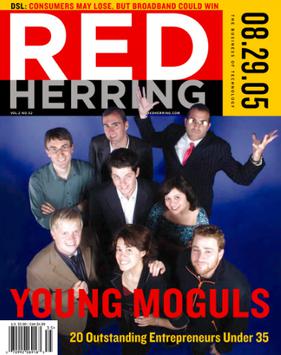 Reading the current issue of Technology Review, it occurred to me that the business of scavenging infrastructural metal appurtenances for scrap shares a great deal in common with the the gossipy business of scavenging information concerning the personages and doings of folk in the dot.com *industries*. I suppose in the former, at least something useful is being pilfered and trafficked, while in the latter?
Reading the current issue of Technology Review, it occurred to me that the business of scavenging infrastructural metal appurtenances for scrap shares a great deal in common with the the gossipy business of scavenging information concerning the personages and doings of folk in the dot.com *industries*. I suppose in the former, at least something useful is being pilfered and trafficked, while in the latter?Nothing brought this notion home more clearly than the opening letter from the editor of the Review titled "The Next Bubble";
I know a little about Web bubbles.The name Red Herring is a reference to the practice of calling a preliminary investment prospectus a "red herring" as a warning to investors that the document was not complete or final. The name reflects the publication's mission: providing a first look at the companies and trends that are shaping the business of technology.
From 1996 to 2002, I was the editor of Red Herring, a magazine the Wall Street Journal dubbed the "bible of the boom." We described the startups of the first bubble, explained their innovations, and chronicled their wonderful capacity for "wealth creation"--our polite shorthand for the fortunes their investors and employees made on a speculative stock market.
While we issued stern warnings about financial euphoria, we profited from it, too. By the middle of 2000 we had some 500,000 enthusiastic readers. Every month, we published two issues of more than 600 pages, whose editorial content was written by expensively recruited journalists from Forbes and the Journal, and whose ads were bought by startups keen to announce their existence, technology vendors frantic to sell products and services, and investment banks eager to brag about the public offerings they had underwritten. It was big business, at least for publishing: in the first six months of 2000, we earned more than $100 million in circulation, advertising, and sponsorship revenues.
With the exception of a small handful of ventures that facilitate and disintermediate a specific class of commercial transactions, amazon.com, ebay, google, etc..., the web 2.0 focused on trying to monetize *social networking* - i.e., scavenge value from human relationships - has proven to be a complete and abject boondoggle. None of the social networking sites makes any money. Other than trading on the personal information of social networking site users for sale to advertisers and others, there's no plan on the horizon for adding value to the users and generating revenue in return for tangible value added;
The new development in 2000 was the Web's alchemical ability to make markets for books, software, or stocks more efficient. In 2008, it is the collaborative, social functions of Web 2.0 that excite investors. The trigger for the dot-com collapse was multibillion-dollar sell orders for bellwether tech stocks that were processed simultaneously soon after NASDAQ reached its high of 5132.52 on March 10, 2000, leading to an unprecedented selloff. Today, the collapse of the housing market and its derivative securities might close the market for initial public offerings and so discourage further investment in Web 2.0 ventures. The Web companies of both eras, however, reveal the same structural problems: they have no clearly understood business, but float on investors' capital and hope that getting big quickly will lead to profits.Not only am I reminded of the pathetic plague of utterly alienated metal scavengers - I'm reminded of the unfolding spectacle of the collapse of the consumption-driven parasitic American financial house of cards built on a foundation of meringue..., didn't any of these folks ever listen to some Billy Preston back in the day?
As Bryant Urstadt explains in "Social Networking Is Not a Business", last March Microsoft bought a 1.6 percent stake in Facebook for $240 million, giving the social-networking site a notional valuation of $15 billion. Yet according to Mark Zuckerberg, the company's chief executive, Facebook will lose $150 million this year. Similarly, Google paid $900 million in 2006 for the right to deliver ads on MySpace, the largest of the social networks, for three years--but Google says the results have been disappointing. So far, no one has much idea what will do for Web 2.0 what keyword advertising (the source of most of Google's 2007 revenues of $16 billion) has done for search.


0 comments:
Post a Comment